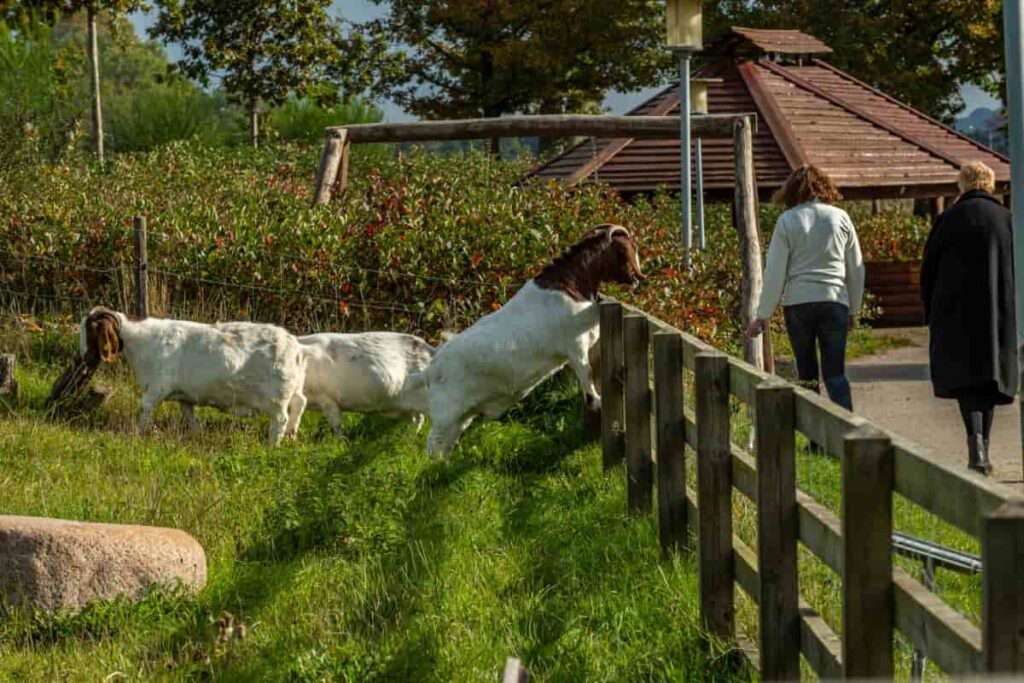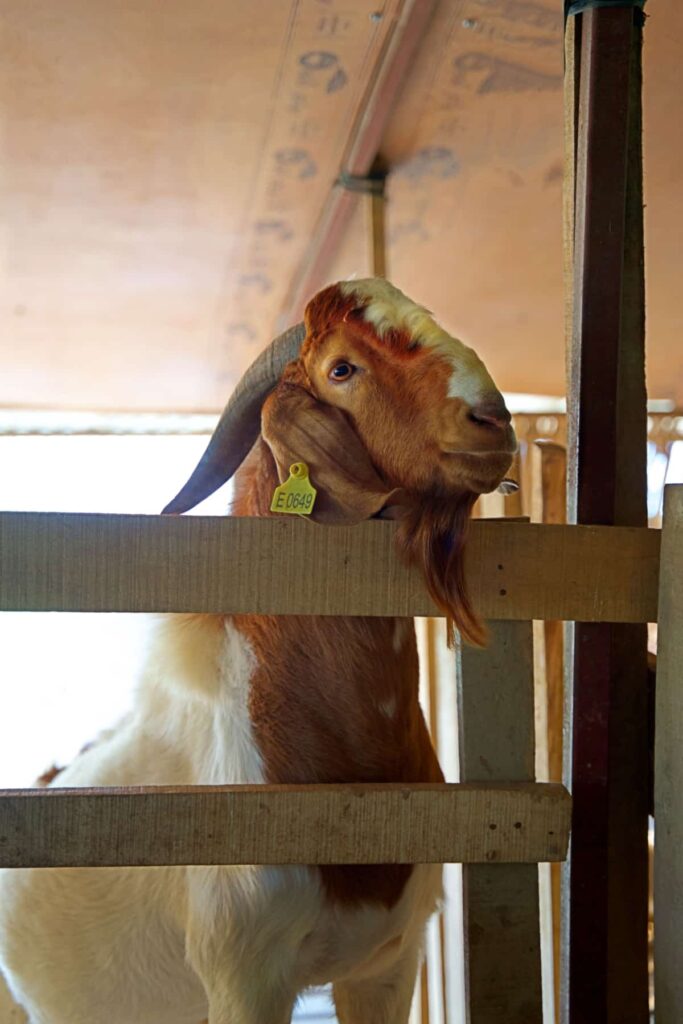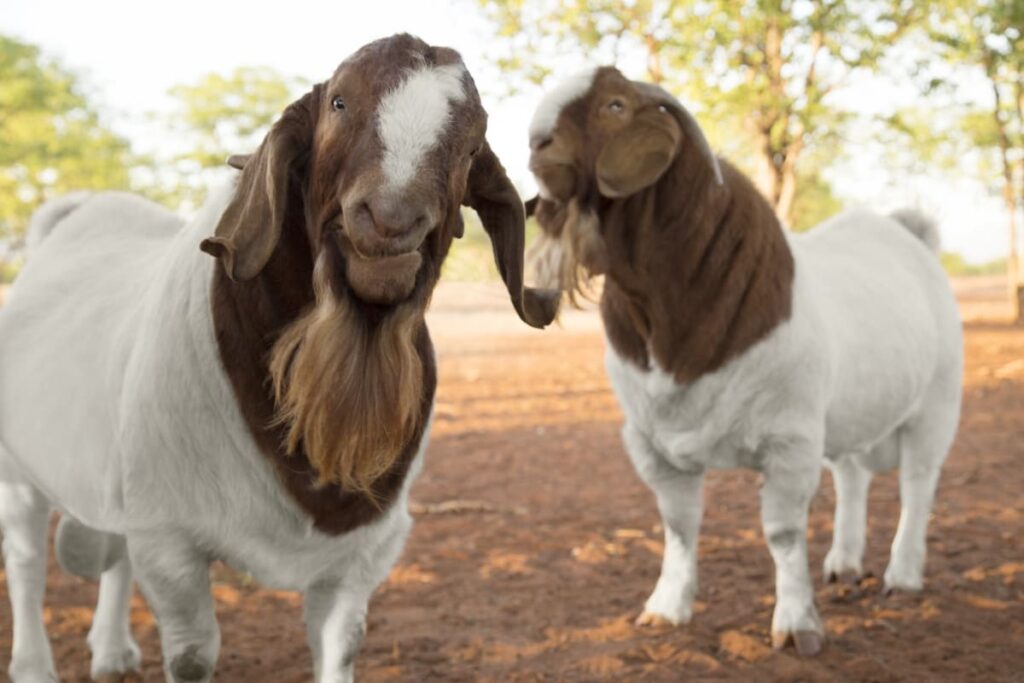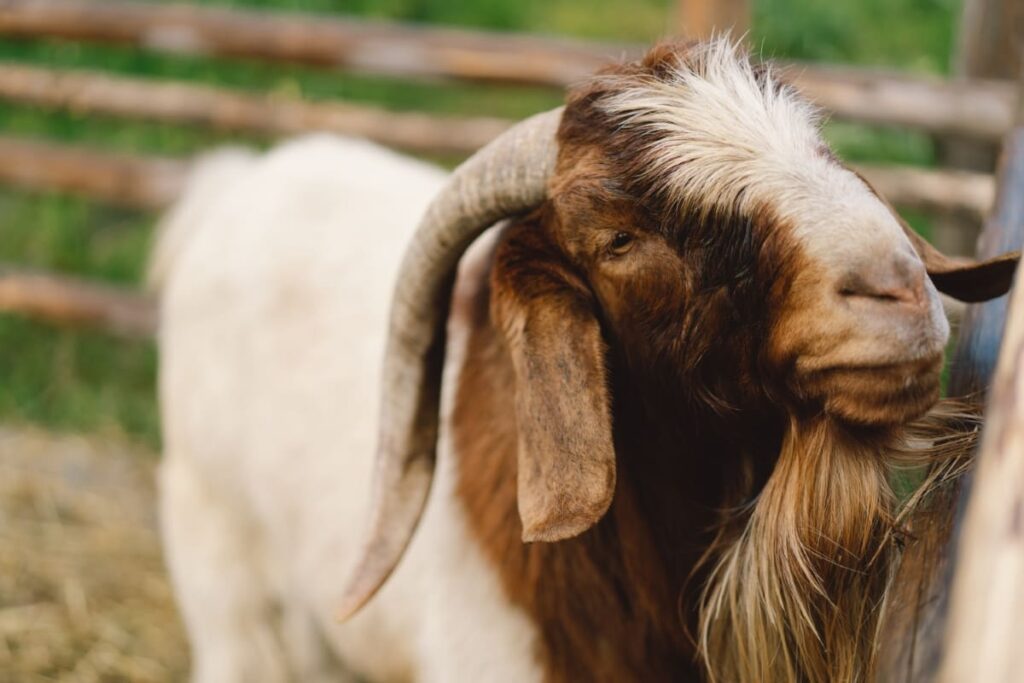The Boer or Boerbok is a South African breed of meat goat that requires proper nutrition to thrive and reach its full potential. These goats are known for their high growth rate and excellent meat quality, but without the right feed management, these characteristics may not be fully realized. Boer goat feed management refers to the practice of providing a well-balanced and nutritious diet to Boer goats, which are known for their meat production.
The Importance of a Balanced Diet
Proper feeding ensures that the goats receive all the nutrients to support their growth, reproduction, and overall health. A nutrient diet plays a major role in supporting optimal growth and development in Boer goats. It consists of various essential components such as proteins, carbohydrates, fats, vitamins, minerals, and water.

Boer Goat Feed Management
Basics of Feed Types
Pasture and Forage
Pasture and forage form the foundation of a goat’s diet. These include grasses, legumes, browse plants, hay, and silage. Providing access to quality pasture allows goats to graze naturally while meeting their nutritional needs. It’s important to rotate pastures regularly to prevent overgrazing.
Concentrates and Supplements
Concentrates usually contain grains such as corn or oats along with protein sources like soybean meal or alfalfa pellets. Supplements can include things like probiotics or yeast cultures to promote digestion.
Minerals and Vitamins
Goats require a balanced blend of essential minerals such as calcium, phosphorus, copper, zinc, selenium, iodine, and more. A mineral block specifically formulated for goats should always be available for free choice.
Forage Management
Grazing Practices
Grazing practices should be carefully managed to ensure that goats have access to fresh and nutritious pasture. Rotational grazing can help prevent overgrazing and allow pastures to recover. It’s important to monitor the condition of the pasture and adjust stocking rates accordingly.
Hay Quality and Selection
Good quality hay should be free from mold or dust and have a good balance of nutrients. Choosing the right type of grass or legume for your goats’ specific needs is also important. Providing high-quality forages through proper grazing practices, selecting good-quality hays, and considering alternatives like silage or haylage can greatly contribute to meeting your Boer goat’s nutritional needs.
Silage and Haylage for Goats
Silage and haylage are alternative forms of preserved forages that can provide additional nutrition during times when fresh pasture or good-quality hay may not be available. These options undergo fermentation processes that help preserve their nutritional content.
Concentrate Feeds
Types of Concentrates
Concentrate feeds play a crucial role in the diet of Boer goats, especially when it comes to growth and maintenance. There are various types of concentrate feeds available for Boer goats, including grain-based mixes, pellets, and commercial goat feed. Grain-based mixes often consist of corn, oats, barley, or other grains that provide a good source of carbohydrates. Pellets are compacted forms of concentrated feed that contain a blend of grains and other ingredients. Commercial goat feed is specifically formulated with balanced nutrition to meet the specific needs of goats.
Feeding Strategies for Growth and Maintenance
For growing kids or young animals requiring rapid growth, higher levels of concentration may be needed compared to mature adults who need more maintenance-focused diets. As with any dietary changes or adjustments in feeding strategies, it’s essential to monitor your goats’ health regularly. Observe their body condition score (BCS) as an indicator if they’re getting enough nutrients from their diet. Remember that each goat is unique and may have different requirements based on factors such as activity level and reproductive stage.
In case you missed it: Integrating Goats into Sustainable Farming Systems

Supplementation Needs
Mineral Supplementation
Mineral supplementation plays a crucial role in maintaining proper body functions, including bone development, immune system support, and reproductive health. When it comes to mineral supplementation for Boer goats, it’s essential to consider their specific requirements. Copper is one of the most critical minerals for these goats as they have higher copper needs compared to other livestock species.
Vitamin Requirements and Sources
Vitamin requirements should not be overlooked either. Vitamins A, D, and E are particularly important for Boer goats’ overall well-being. Vitamin A supports vision and skin health, while vitamin D helps in calcium for strong bones. Vitamin E for goats acts as an antioxidant, that is helpful to protecting cell membranes from damage.
Water Requirements
Importance of Clean Water
Water is an essential component of a Boer goat’s diet and overall health. Clean water plays a major role in maintaining hydration, aiding digestion, regulating body temperature, and ensuring proper organ function. Providing access to clean water at all times is vital for the well-being of these animals.
Water Intake and Regulation
Boer goats have high water requirements, especially during hot weather or when lactating. They need to drink enough water to meet their daily needs and replace any fluids lost through sweating or milk production. Water intake can change based on different factors like age, size, activity level, and environmental conditions. Cleanliness is equally important when it comes to providing water for your Boer goats. In addition to cleanliness and availability of clean drinking water at all times, adequate regulation should also be considered when managing a Boer goat’s hydration levels.
Feeding Practices Through Life Stages
Feeding Kids and Weanlings
During this stage, their nutritional needs are different from adult goats. Kids should have access to high-quality forage and be introduced to concentrates gradually. Providing a diet rich in protein and energy is essential for their growth and development.
Nutritional Management of Does and Bucks
Nutritional management of does and bucks also plays a vital role in ensuring the overall productivity of your herd. Pregnant does require additional nutrients to support fetal growth, so adjusting their diet accordingly is important. Bucks, on the other hand, may have higher energy requirements due to breeding activities.
Senior Goat Nutrition
Senior goat nutrition requires special attention as well. Older goats may experience dental problems or reduced digestive efficiency, making it necessary to provide them with easily digestible feeds such as soaked hay pellets or complete senior goat feeds.
In case you missed it: Australian Melaan Goat: Characteristics, Price, Disadvantages, and Raising

Seasonal Feeding Considerations
Adjusting Diets for Winter
As temperatures drop in winter, adjustments need to be made to ensure that your goats are getting the right nutrients to stay healthy and maintain their body condition. During winter months, grazing may become limited or even non-existent. This means that you’ll need to rely more on stored feeds such as hay or silage. It’s crucial to choose high-quality forage that is free from mold or dust, which can cause respiratory issues in goats.
In addition to providing adequate forage during the colder months, you should also consider increasing the energy content of their diet by offering concentrates like grains or pellets. These supplements will help meet their increased energy requirements due to lower ambient temperatures.
Summer Feeding and Heat Stress Management
Summer brings some challenges, especially when it comes to heat stress management. Goats are susceptible to heat stress as they struggle with regulating their body temperature in hot weather conditions.
To prevent heat stress, make sure there is always access to clean water throughout the day and provide shade options where your goats can escape the scorching sun. You may also want to adjust their feeding schedule by offering smaller meals more frequently during cooler parts of the day. Remember that each season presents unique feeding considerations for Boer goat management.
In case you missed it: Asmari Goat: Breed Characteristics, Origin, Size, Lifespan, Price, and Raising

Conclusion
Boer goats have specific dietary requirements that must be met through a carefully planned feeding program. This includes providing goats with adequate amounts of pasture and forage, concentrates, and supplements, as well as minerals and vitamins. Each component plays a major role in supporting different aspects of the goat’s health.
- Types of Grass Growing for Goat Farm
- How to Train Goats for Milking: A Beginners Guide
- Goat Milking Practices and Equipment: A Beginner’s Guide
- Goat Farming for Fiber: Producing Mohair and Cashmere
- Maximizing Goat Milk Production: Tips for Dairy Goat Farmers
- Goat Farming as a Family Business: Strategies for Success
- Profitable Kenya Goat Breeds for Commercial Dairy and Meat Business
- Unlock the Secrets of Oberhasli Goat: Discover Raising and Management Practices
- Ultimate Guide to Myotonic Goats: Explore Profile to Raising